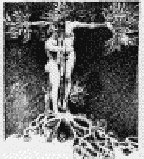

The theme of this issue is one too familiar to gay men these days. We all know too much about grieving and we've all seen too much of dying.
Famed Welsh poet Dylan Thomas (who himself died at age 39 of alcohol overdose) popularized a peculiarly unhealthy notion about grieving and dying: "Do not go gentle into that good night. Rage, rage against the dying of the light." While there is a certain Promethean heroicism in that attitude, it is probably not very good psychological&emdash;or spiritual&emdash;advice. Anger is certainly part of the grieving process, but it is only a step in working toward acceptance and transcendence. (Was it Thomas's rage at his father's death, at his own inevitable demise, and at the human condition itself that inspired the drinking bout that killed him, much too prematurely?)
Grieving and dying are central spiritual issues: they remind us of our mortality and dependency; they engender deep and profound feelings and stir deep memories and affections; and they call us to look beyond the surface of our lives. Work with the dying and the bereaved and investigation of the dying experience itself has, in recent years, popularized a more positive vision of death. Dylan Thomas said "Rage against the dying of the light." The new paradigms of dying say, rather, "Go into the light." They tell us death is passage through a door, entry to a tunnel that leads beyond to light unimaginable. Many of us who have had the experience of participating in another's death have discovered that when the door to the afterworld opens to admit the dying person, sometimes the light is so bright that those in attendance see it too, or at least feel it so deeply in their souls that their own attitudes change. Grieving then can be a way of keeping open the door to the light eternal. Grief can be a sinking into self-pity and despair. But it can also be a continung practice of seeing from the transcendent perspective. Honoring those whom we have lost to death, grieving our own loss and grieving the pain we've experienced in life, as life, can result in wallowing in anger at life and at death or in celebrating the eternal incarnated momentarily in time.
As the tormented gay poet, G.M. Hopkins, reminds us whenever we cry at the passing of another--even just the turning of the leaves in autumn--it is really ourselves we are crying for. When we grieve it is our own mortality we grieve for. Grieving then can be an introduction to our own deepest selves. It can truly be a work of the spirit.
We have an interesting collection of articles this issue. Most are about grieving death and understanding how AIDS has affected a whole generation of gay men. There is an interesting variation in Kevin Roeder's essay on grieving the loss of heterosexuality and the poem by Edward Hale that accompanies it: a reminder that grieving and bereavement are only sometimes about death, most of the time they are about the daily experience of change and the passing of time. It is in our moment to moment loss, as today becomes yesterday, that we must seek and find spiritual vision.
Poetry Editor Bo Young has gathered a lovely Special Section of poetry with this underlying theme of finding joy and love and deep significance in our experience even of loss and pain. And artist John Steczynski has once again submitted a poignant series of icons of grief to grace the pages of this season's issue of White Crane Journal. As we go into autumn and the dying of nature, let's remember the fundamental spiritual message of ever-recurring spring. We make spring for ourselves and for others by our attitude of love.
Michael Kelly, "the erotic contemplative," led a retreat at Peregrine's Perspective this past August, sponsored by EroSpirit and gay spirit luminary Joseph Kramer. A small group of eight, all very interesting men, met to share Kelly's vision of gay spirituality.
Perhaps the high point of the retreat was Kelly's moving account of the spiritual practice of "making love to the Crucified Christ." Based partly in the story of St. Francis of Assisi's receiving the stigmata and partly in the poetic revery of St. John of the Cross's poem "On a dark night," Kelly's message was that suffering and grief, disappointment and failure are necessary parts of human life. Embracing them, rather than resisting them, resolves and releases them. Making love to the Crucified Christ means making love to the world with all its inherent suffering--and all its ugliness.
We have lived through hard years, all of us. The "right answer," the spiritual answer to the turmoil of the present time is acceptance and forgiveness. Then the dark night ends, the dawn comes and we find ourselves among the lilies.